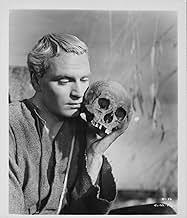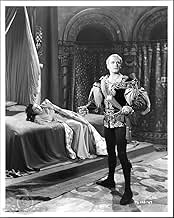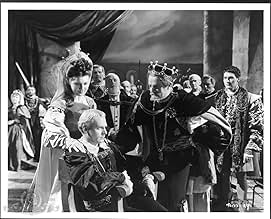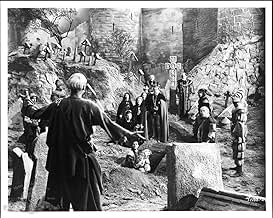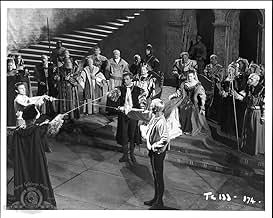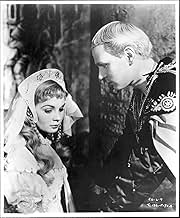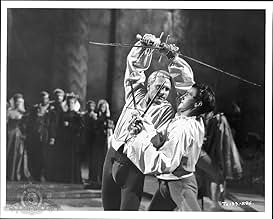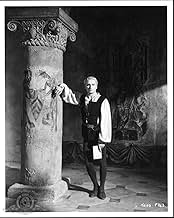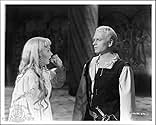O príncipe Hamlet se debate se deve ou não matar seu tio, que ele suspeita ter assassinado seu pai, o antigo rei.O príncipe Hamlet se debate se deve ou não matar seu tio, que ele suspeita ter assassinado seu pai, o antigo rei.O príncipe Hamlet se debate se deve ou não matar seu tio, que ele suspeita ter assassinado seu pai, o antigo rei.
- Ganhou 4 Oscars
- 16 vitórias e 6 indicações no total
- Undetermined Secondary Role
- (não creditado)
- Direção
- Roteiristas
- Elenco e equipe completos
- Produção, bilheteria e muito mais no IMDbPro
Best Picture Winners by Year
Best Picture Winners by Year
Enredo
Você sabia?
- CuriosidadesWhen the movie was released, Sir Laurence Olivier said it had been filmed in black and white for artistic reasons. The true reason, as he later admitted, was that "I was in the middle of a furious row with Technicolor".
- Erros de gravaçãoA clock is heard chiming the half-hour in Westminster chimes. If chiming clocks were invented at the time of the action they wouldn't sound the Westminster chimes which date only - as the name suggests - from the installation of the Big Ben clock in 1859.
- Citações
Hamlet, Prince of Denmark: To be, or not to be: that is the question: Whether 'tis nobler in the mind to suffer the slings and arrows of outrageous fortune, Or to take arms against a sea of troubles, And by opposing end them? To die: to sleep; No more; and by a sleep to say we end The heart-ache and the thousand natural shocks That flesh is heir to, 'tis a consummation Devoutly to be wish'd. To die, to sleep; To sleep: perchance to dream: ay, there's the rub; For in that sleep of death what dreams may come When we have shuffled off this mortal coil, Must give us pause: there's the respect That makes calamity of so long life; For who would bear the whips and scorns of time, The oppressor's wrong, the proud man's contumely, The pangs of despised love, the law's delay, The insolence of office and the spurns That patient merit of the unworthy takes, When he himself might his quietus make With a bare bodkin? Who would fardels bear, To grunt and sweat under a weary life, But that the dread of something after death, The undiscover'd country from whose bourn No traveller returns, puzzles the will And makes us rather bear those ills we have Than fly to others that we know not of? Thus conscience does make cowards of us all; And thus the native hue of resolution Is sicklied o'er with the pale cast of thought, And enterprises of great pith and moment With this regard their currents turn awry, And lose the name of action.
- Cenas durante ou pós-créditosOpening credits prologue:
So oft it chances in particular men That through some vicious mole of nature in them, By the o'ergrowth of some complexion Oft breaking down the pales and forts of reason, Or by some habit grown too much; that these men - Carrying, I say, the stamp of one defect, Their virtues else - be they as pure as grace, Shall in the general censure take corruption From that particular fault.
- ConexõesEdited into Histoire(s) du cinéma: Une vague nouvelle (1999)
I see a few very strong elements with some blots, and I suppose these have both become amplified with the passage of 50 years.
First, the blots:
-- Every actor but Olivier is of lesser caliber. I suspect that some of this is what he had to work with, and some apparent clumsiness results from the then standard rendering of the Bard's works as speechifying.
-- The women, especially Ophelia are dreadful, absolutely dreadful -- Ophelia's only present because she screwed the boss.
-- The score was so heavy, so dated and so hard to ignore it almost made me turn away, regardless of the balancing strengths.
-- Hamlet's text presents problems. The best choice in my opinion is to keep it all as Branagh has. But the standard wisdom is that audiences won't sit through 4 hours, no matter how engaging. Then, the question is what to cut. One often keeps the well-known speeches and cuts into the plot about ideas. So here we lose Fortinbras, Rosenkrantz and Guildenstern, together with some rather lovely related language and notions. Too bad because there is a development in the logic of metaphor in the later, longer version of the play, and this is totally lost here.
-- Olivier insists on including the notion of Oedipus and Gertrude, absolutely not supported by the text, and only inferred if you don't understand that Hamlet's initial distress is because his succession has been interrupted (not that his access to his Mother has been interrupted).
-- Worse, Olivier not only believes Hamlet is a 'man that couldn't make up his mind' but tells us so at the beginning! Does he not get it? Does he not understand the complexities of reason? This is not a play about doubt, but about reasoning.
Now the gems:
-- Even though Olivier gets the character wrong, and has cut some good lines, he has a natural talent for living well in the language. Even though he's coming from the wrong place, and overly postures, his rendering of the lines comes from a rare genius. Worth experiencing, despite the surrounding distractions.
-- The costumes are too lush for my tastes, but they fit the set. And my, what a set it is. Except for the cheesy painted sky, this castle is pretty wonderful: lots of colonnaded corridors, mezzanines, stairs, aligned archways. Olivier may be trying to top archrival Orson Wells, but I think he has done very well in using the building to frame the action in a way that is fully cinematic, transcending the stage. The only effect that jarred was the thrice-done long pullback when Claudius conspires with Laertes.
--The film is in Black and White. Olivier had no choice of course, but it is a happy accident. Allows the photography to be more artistic, better lit, more abstract, just as the mood of the play would have it.
Bottom line: This is worth seeing to discuss, but the Branagh version is more true and has many fewer distracting blots.
- tedg
- 11 de jun. de 2000
- Link permanente
Principais escolhas
Detalhes
- Data de lançamento
- País de origem
- Idioma
- Também conhecido como
- Гамлет
- Locações de filme
- D&P Studios, Denham, Uxbridge, Buckinghamshire, Inglaterra, Reino Unido(studio: made at D&P Studios)
- Empresa de produção
- Consulte mais créditos da empresa na IMDbPro
Bilheteria
- Orçamento
- £ 500.000 (estimativa)
- Tempo de duração2 horas 34 minutos
- Cor
- Proporção
- 1.37 : 1
Contribua para esta página



